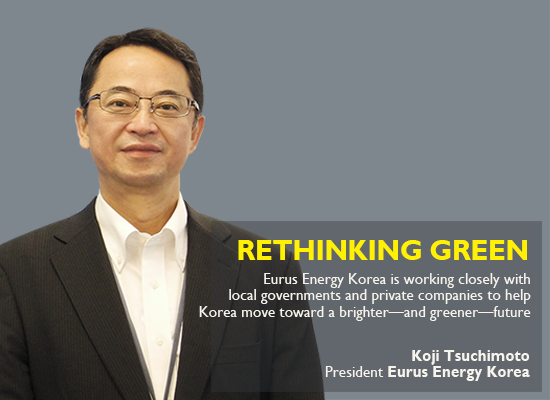Feature Stories
- Home
- Why KOREA
- Feature Stories

Eurus Energy Korea is working closely with local governments and private companies to help Korea move toward a brighter—and greener—future
U.S. President Donald Trump’s decision to withdraw America from the Paris climate accord shook the world last month, with environmentalists and politicians expressing deep concern. Despite Trump’s decision, world leaders pledged to honor the Paris accord, essentially an agreement between 196 countries to reduce emissions of greenhouse gases. His decision may have raised eyebrows among the international community, but more importantly, it shed some much needed light on renewable energy and energy efficiency. Many private companies are now more vocal than ever to combating climate change.
But even before the Paris agreement came to life, there’s one company that has been pushing forward with renewable energy projects since the late 1980s: Eurus Energy Holdings. As Japan’s largest wind power business, Eurus is owned jointly by Toyota Tsusho Corporation and Tokyo Electric Power Company Holdings. It has been actively pursuing its wind and photovoltaic power generation business in 11 countries, including the United States, Spain, Italy and Australia. The company, choosing Korea as a base for expanding in the Northeast Asia region, established Eurus Energy Korea (EEK).
Korea proved to be a suitable business environment for companies like Eurus to commercialize eco-friendly ventures, especially with the rapid growth of the country’s photovoltaics and wind power sectors. The two sectors now account for 34 percent of the renewable energy industry’s employment and 80 percent of sales. The Korean government also recently announced that by 2030, it plans to increase its use of renewable energy to 20 percent, a 15 percent increase from today’s proportion.
EEK is working closely with Korea’s public and private spheres to help the country move toward a brighter, greener future. “In an effort to supply renewable energy and lower carbon dioxide levels in Korea, we hired local employees with great insight and a good grasp of the environment,” says Koji Tsuchimoto, President of EEK. “By establishing a subsidiary in Korea, we have greater mobility in domestic markets.”
The company currently manages three wind power sites and two solar power sites in Korea. Most notably, EEK established Gangwon Wind Park in Daegwallyeong in Gangwon-do in 2005 The park was authorized by the United Nations as a Clean Development Mechanism Project in accordance with the Kyoto Protocol.
Just three years later, Eurus and POSCO, Korea’s leading engineering and construction corporation, completed construction of Taegisan Wind Farm. The complex, located on the ridge of Mt. Taegi, is home to 20 wind turbines. It’s capable of supplying energy to about 25,000 households while cutting down on carbon dioxide emissions by some 60,000 tons a year. EEK also operates two solar power plants in Jeolla-do: the South-West Sunchang Photovoltaic Power Plant and the Jindo Photovoltaic Power Plant. But that’s not all— EEK works closely with Korea’s power and construction companies through the establishment of joint ventures.
Although EEK is taking full advantage of Korea’s great business environment, Tsuchimoto says the Korean government can do more. “Korea’s financial market needs to be more open. If difficulties in procurement and various regulations that hinder business expansion can be resolved, I think the country can significantly improve its appeal as an investment destination.”
Tsuchimoto mentions that gaining government approval for building renewable energy generation facilities in Korea is a difficult and complicated process. However, the government’s levy exemption certificate system, designed to accelerate the introduction of renewable energy across the country, has encouraged the company to actively pursue further business in Korea. Despite its significant impact on Korea’s renewable energy sector, EEK is not resting on its laurels, instead choosing to make a mark that goes well beyond the nation’s borders.
By Esther Oh (estheroh@kotra.or.kr)
Executive Consultant/Invest Korea










